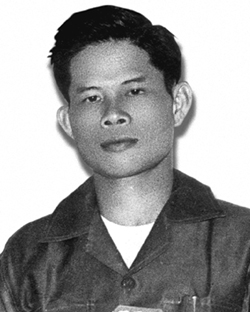
Since graduating first lieutenant in 1951 and with his first assignment at the 21st Mobile Battalion, Dzinh fought valiantly on different battlefields and was wounded many times all over the body. Very early in his military career, this officer, who was the valedictorian of his class of Tran Hung Dao, became the pride of his classmates when in 1958, he replaced Lieutenant Colonel Nguyen Van Vinh to become acting commander of the 15th Infantry Division stationed at Duc My; the division moved later on to Ban Me Thuot. Here, the Division was renamed 23rd Infantry Division. Thus, he was the first commander of the two Divisions, 23rd Infantry (1958) and 9th Infantry (1962). Furthermore, Bui Dzinh was also 21st Infantry Division Deputy Commander (about 1960) under Colonel Tran Thien Khiem as commander. The following year, he was also 5th Infantry Division Deputy Commander (1961) under Colonel Nguyen Duc Thang as commander, before he was promoted Colonel and 9th Infantry Division Commander in 1962. Around that time, the division did not have a deputy commander, only a chief of staff in the person of a Class 3 classmate, Lieutenant Colonel Ton That Dong (who later became Vinh Binh’ s Chief Province and a House Representative under the Second Republic of Vietnam. His other classmates were: Major Chuong Dzenh Quay, a Regimental Commander (who later became Brigadier General and 25th Infantry Division), Major Nguyen Ca, another Regimental Commander (who later became a Colonel and President Nguyen Van Thieu’s chief of cabinet)…

Bui Dzinh’s military career ended in mid November 1963 because he did not approve the coup d’etat against President Ngo Dinh Diem… He was placed on no pay leave…A couple of years later, he appeared before the Medical Screening Board at the Military Service Exempt Center and was issued a discharge paper based on a 100% disability due to three pieces of mortar shrapnel still lodged in his skull until this day… In 1965, he and Lam Van Phat, Huynh Van Ton, Nhan Minh Trang, Pham Ngoc Thao, Le Hoang Thao…fomented a military putsch on 2/19 against Head of State General Nguyen Khanh with the intention of stabilizing the deteriorating political and military situations around that time. The attempt failed because it did not receive the backup from the Americans. Dzinh was put in prison a couple of months later at Chi Hoa penitentiary. He remained there for two years until 4/1/.67, when President Nguyen Van Thieu promulgated the constitution of the Second Republic of Vietnam, at which time he was released from prison and set free.
On 4/30/1975, Dzinh and his family remained in Vietnam because they did not have the means to escape like many other people. Although he was military discharged longtime ago, he was dispatched by the Communist Regime to reeducation camps in the North with other high-ranking ARVN officers: Hoang Lien Son, Yen Bai, Ha Nam Ninh. After a serious accident sustained at a work place in the reeducation camp, many of his co-detainees still think Dzinh was dead until today.
He was released at the end of 1980, and was not left alone because the local authority forced him to go to the new economic zone. After a couple of months, he and two of his sons escaped the country by sea and ended up in a refugee camp in Thailand. They finally opted to be resettled in France.
That’s what I knew about Bui Dzinh. He shuns the public, hates the war and suffers the life of an exiled. He does not want to say much about the Vietnam War to the next generations. He seems to want to secure for himself a tranquil existence at his age of 78 until the end of his life. He feels no desire to write a memoir about his military career, not like some other exiled general officers, who promoted themselves while denigrating the others by publishing books in order to distance themselves of the missteps they committed in the period prior to 1975.
Bui Dzung.
May 10, 2006